As COVID-19 passes across the globe, Latin America may be hard-hit, with deep humanitarian, economic, and political consequences. In early March, there was hope that the remoteness or the weather in Latin America might help it escape the virus. But within three weeks, the number of known infections jumped exponentially, spreading to every country in the region and, for instance, most of the provinces of Brazil and Ecuador. Many now fear that Latin America may go the way of Italy — with too many cases already circulating to gain control of the virus for many weeks or months, creating a crisis for underfunded health systems and for the region’s economies.
The longer-term implications of the crisis are grim, and the social, political, and economic consequences could be dramatic.
Swift disease, delayed responses
COVID-19 was slow to hit Latin America but escalated sharply in March. The first Latin American case was confirmed in Brazil on February 26, and was recorded in six countries by March 5. Having recorded 2,274 cases by March 24, Brazil led the region with roughly twice as many cases as Ecuador (1,082) and Chile (1,142), followed by Peru, Panama, Argentina, and Mexico (between 350-450 cases each). These numbers may seem low; however, only two weeks earlier, no Latin American country had reached 25 cases. Brazil’s health minister, contrasting the number of beds with the rapid spread of the disease, said on March 20: “Clearly, by the end of April, our health system will collapse.”
Overall, most governments were behind the curve, waiting until cases had appeared, then swiftly taking sweeping measures. The region is now probably two weeks ahead of the stage when Italy and the United States began to seriously address the crisis. The pace and level of responses varied.
On one extreme was El Salvador’s popular 38 year-old president, Nayib Bukele, who was the first to declare a ban on flights, first from China on January 31, then from South Korea and Italy on February 25, weeks before his country’s first positive test of COVID-19. At the opposite end of the spectrum were Brazil’s President Jair Bolsonaro and Mexico’s Andrés Manuel López Obrador (AMLO). Both were slow to act and belittled the seriousness of the crisis. Their dismissal of scientific concerns was exceeded only by Nicaragua’s President Daniel Ortega, who led a “Love in the Time of Coronavirus” parade on March 14.
Most countries adopted several common measures between March 11 and 22, including banning flights from key countries, prohibiting large public gatherings, and suspending school. Several governments imposed shelter-in-place measures on some or all areas, as well as closing restaurants and bars in key cities.
All these policies may be too little too late for countries whose health systems are relatively underfunded. The per capita expenditure in Latin America and the Caribbean on health each year is $949, a little over one-quarter that of Italy and OECD countries as a whole. The crisis is likely to become acute in Venezuela due to the combination of a preexisting economic recession, high levels of hunger, rock-bottom oil revenues, degraded access to potable water, and weakened health systems.
If there is a silver lining, some Latin American countries may offer lessons for others. The Salvadoran government announced a freeze on mortgage and credit card debt for those directly affected economically or socially by the health emergency, and will suspend utility, cable, and internet payments for three months to be redistributed interest-free over two years. On March 22, Argentina’s Civil Court announced an automatic extension of all domestic violence protection orders through May 18, a worthy precedent. Panama placed a 23% limit on profit for medical equipment sales.
Politics, populism, and democracy
The COVID-19 crisis raises serious concerns about democracy and poses a test for populism in the region. The most notable reactions have been widespread criticism of Bolsonaro and AMLO for their persistently cavalier attitudes. Like a typical populist, Bolsonaro has invoked the fake news trope by calling the COVID-19 virus a media “fantasy” and rejecting criticism of his administration’s response: “I’m the manager of the team and the team is playing very well, thank God.” People were especially outraged when, after his doctor announced that Bolsonaro would be in quarantine, the president joined his supporters in street protests targeting democratic institutions, physically touching 272 people, according to one local news source.
Numerous former allies have distanced themselves from Bolsonaro in the past two weeks, including the two prominent governors of São Paolo and Rio de Janeiro, whom the president called “irresponsible” for imposing quarantines and “creating a climate of terror.” Some political scientists see little chance for Bolsonaro to weather the storm. An editorial in the conservative Estado of São Paolo concluded the “government’s incompetence is found to be incurable.” Unable to march in the streets, people in major urban areas began on March 18 a daily panelaço, banging pots and pans out their windows and chanting “Bolsonaro Out!”
Mexico’s AMLO, like Bolsonaro, made a point to publicly wander the streets, tweeting selfies and kissing a baby on March 21. He urged people to chill and read García Márquez’ famous novel Love in the Time of Cholera. Meanwhile, a federal judge ordered AMLO to take all preventive measures and necessary actions to detect infected persons in the country.
What distinguishes two of the most recalcitrant heads of government — Brazil’s Bolsonaro and Mexico’s AMLO — is not ideology. Instead, both presidents share a populist nationalism that includes an aversion to scientific inquiry and to state institutions, reminiscent of the “deep state” critique by President Trump. The crisis will be a test for populism. Venezuela watchers have also speculated about whether the crisis will bring down the embattled Nicolás Maduro regime.
On the other hand, history shows that such crises may be just as likely to help strengthen the government. Bolivia’s rightist interim government just postponed presidential elections indefinitely, a controversial move after what many consider a coup against leftist President Evo Morales last year. And Chile’s congress postponed a constitutional referendum that had been a key concession in the face of street protests in previous months.
In fact, the crisis may pose long-term challenges for democracy in the region. Apart from the suspension of various rights, the possibilities for organized protest are diminished while the powers of the state are enhanced. Given the rise of non-violent street protest as the main mode of popular expression outside of the voting booth, these new developments will force new strategies for political opposition and for civil society organizers, at least in the near term.
Human rights concerns
Human rights organizations throughout the region have signaled their concern that the measures to combat COVID-19 could become a means to suppress opposition political forces or the right to popular dissent. Experts have publicly reminded governments of their international legal obligations to not apply emergency laws in a discriminatory manner against specific minorities or groups, to adopt those measures that are strictly necessary, to base them in scientific evidence, and to return to normal as soon as possible. Concerns about the militarization of justice and security have arisen in Peru, where President Martín Vizcarra deployed the military to enforce its quarantine.
With the closure of the U.S.-Mexico border to non-essential traffic, President Trump also announced that all undocumented immigrants would be sent home, including asylum seekers who will not receive the hearings to which they are entitled under law. Officials also fear an outbreak of COVID-19 in the densely populated makeshift camps where many of the 60,000 asylum applicants sent to Mexico in recent months are concentrated, imperiling health conditions in those camps and the healthcare systems of nearby cities.
Latin American states’ limited ability to control prisons and the prevalence of violence inside them make it a special challenge for health professionals to address both health and safety concerns, as prisons will likely become a breeding ground for coronavirus. In Santa Bárbara, Venezuela, 80 prisoners escaped and 12 were killed during riots due to tighter restrictions related to coronavirus.
Stemming economic disaster?
In the past three weeks, the region’s economic forecast has turned dark. Economists concur that global recession is inevitable. In contrast to the financial crisis of 2008, when the region departed from relatively strong fiscal performance, the fiscal positions in 2019 were already weakened. The region grew only 0.2% in 2019. The collapse of oil prices was portended to affect the largest oil exporters, especially those most reliant — Venezuela and Ecuador.
On March 18, Goldman Sachs adjusted its projections for Latin America’s economic growth from +1.1% to -1.2%. Its projections for Brazil dropped from over 2% at the beginning of the year to -0.9%, and projections for Mexico declined from +0.6% to -1.6%. An enormous share of Latin America’s economy is informal — 55% of workers — and those people lack the social safety nets of the formal sector.
Supply chains will also be affected from China and the United States. Over one-third of Brazilian exports go to China, with larger shares for soybeans, oil, and iron ore. These exports have been cut back dramatically since the outbreak of COVID-19, and many ships sit unloaded in Chinese ports. Several countries, especially in the Caribbean, depend on tourism, which will be hard-hit.
Finding a path through
For now, the public health effects of coronavirus in Latin America are much less than in North America, Europe, and Asia. But they are likely to grow rapidly. What should be done? Most of the region’s governments are now taking the aggressive action needed to fight the virus. Local leaders and citizens in Mexico and Brazil are placing more pressure on their reticent presidents to take stronger action. But international pressure may be needed.
On economic policy, Mexico, Brazil, and other countries have already cut interest rates to try to stimulate the economy. Further such cuts may be needed, and Brazil faces the additional challenge of a currency that has dropped 16% in value since the beginning of the year. Chile, under pressure from protests demanding increased social spending, announced a $11.75 billion stimulus package hoping to address the pandemic’s consequences.
Like El Salvador, governments must find ways for those most affected to urgently access support systems including health care and economic sustenance. These should focus especially on addressing the informal sector. These experiments will yield lessons for future emergencies.
Multilateral institutions have largely been absent in the response in Latin America. Yet their funding will be necessary for the region’s societies and economies to recover. International organizations can also support the demands of civil society organizations and opposition parties for specific new mechanisms for transparence and accountability, as the U.S. Congress approved this week in the COVID-19 emergency relief package.
In recent years, corruption has become one of the top concerns of everyday citizens in the region. Even in normal times, the health sector is the site for $500 billion in corruption globally. The fiscal response to the health crisis offers political and business leaders a new chance to loot the coffers of the state (as occurred in Honduras a few years ago, almost bringing down the president). Both international and national actors should strengthen, rather than suspend, mechanisms for accountability and transparency as billions of dollars are mobilized outside of regular channels.
Insisting on good governance may be too much to ask in these times, when some of the world’s most powerful states emphasize sovereignty and nationalism. Yet it is especially necessary in this period of generalized fear and suspended rights.
Latin America’s recent urgent efforts to fight COVID-19 may be enough to contain its spread faster than other countries have. However, its weak institutions, the rapid spread in many countries, and the reticence of some leaders to take effective measures raise the specter that the pandemic could pose deep and transformative challenges for the region’s economies, democracies, and societies.
American University Research Assistant Jeff Hallock provided research for this piece.
The Brookings Institution is committed to quality, independence, and impact.
We are supported by a diverse array of funders. In line with our values and policies, each Brookings publication represents the sole views of its author(s).

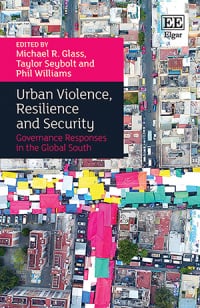
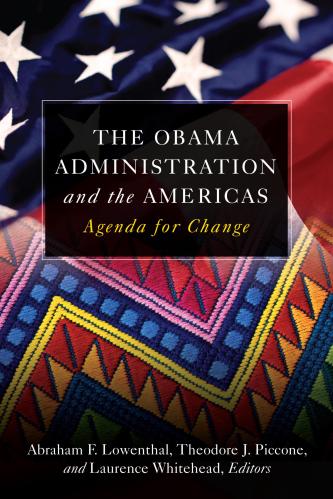

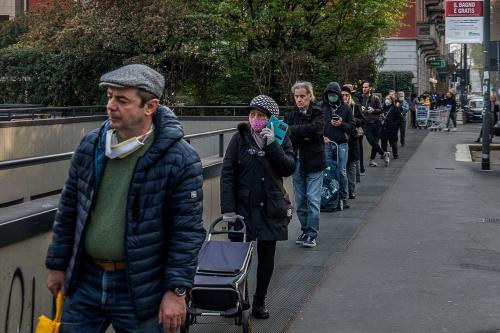
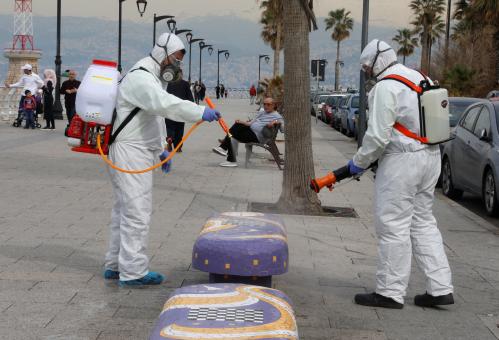
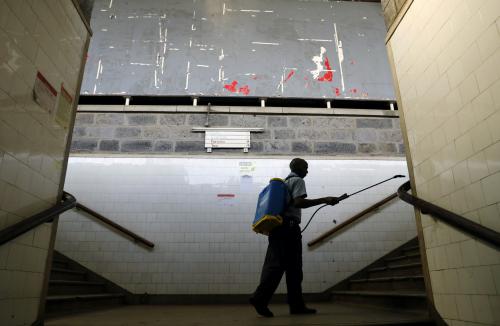




Commentary
As coronavirus hits Latin America, expect serious and enduring effects
March 26, 2020